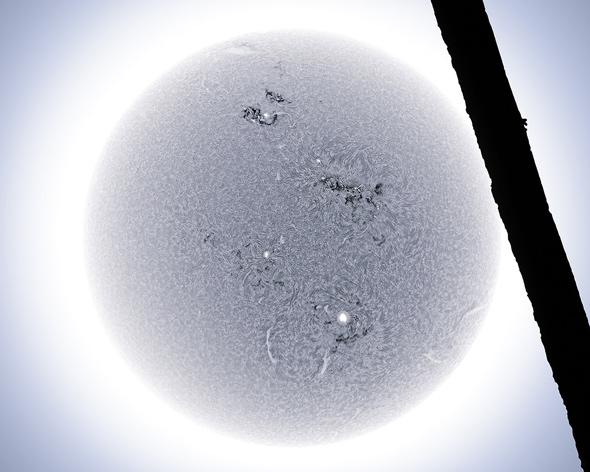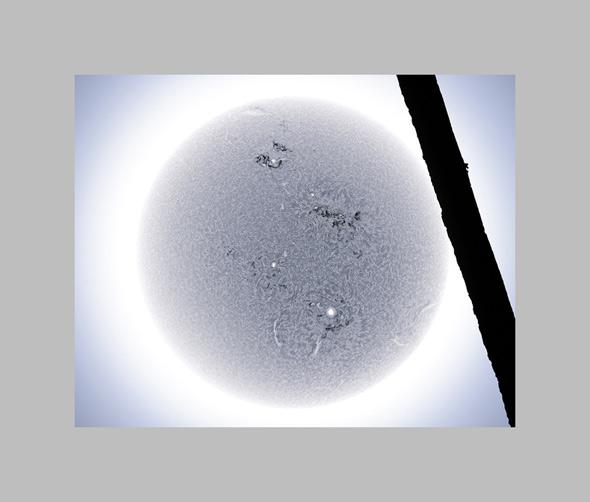I realized recently I hadn’t posted a jaw-dropping brain-twisting picture of the Sun from photographer Alan Friedman for a while, so I checked his blog and promptly got my jaw dropped and my brain melted:

Photo by Alan Friedman
The first thing your brain should do after recovering from looking at this shot is ask itself, “What. The. Frak?”
Yeah, I don’t blame it. There are a few things going on here.
First, when Alan took this picture on Nov. 16, 2013, he used a special filter on his telescope that lets through light emitted by warm hydrogen gas. This light traces the gas that’s flowing along the Sun’s strong and complicated magnetic field lines. These are particularly intense near sunspots, and along the arcing filaments across the Sun’s face.
Second, Alan reversed the image, making it a negative, which brings out more detail (our eyes and brain see dark things against a light background better than vice-versa). This makes sunspots look bright, and bright active regions look dark. He only does this for the disk of the Sun, leaving the background sky positive to provide that glow. Scientifically that last bit doesn’t really help, but artistically it’s breathtaking.
And that weird dark stripe boldly blasting through the shot? That’s a power line across the way from Alan’s house! The Sun happened to be passing right behind it when he took the picture, so it’s seen as a dark silhouette cutting right through the face of our star.
There’s a nice little metaphor here: The powerful magnetic field loops you see on the Sun in the photo can sometimes snap, releasing their energy as solar flares and coronal mass ejections. These intense blasts of subatomic particles and light can play havoc with Earth’s magnetic field, which in turn can generate vast currents of electricity underground. Through a process called induction, this can create currents in power lines. If the effect is strong enough it can overload the power grid, causing damage to the lines, the transformers, and the power generating stations. Blackouts can result, like what happened to Quebec in 1989.
In the photo we see the power line blocking the Sun, but in reality, the reverse can and does happen.

Photo by Alan Friedman.
One final note. When I was fiddling with this image in Photoshop to resize it, I got another surprise from it: It really looks like the edges of the frame are bulging outward! Does it look that way to you too? Use a ruler or some other straight-edge against the picture, and you’ll see the border is in fact quite straight. It only looks convex because of the round Sun and the fading glow around it; the curving aspect of the glow (together with how it fades radially with distance from the Sun) tricks your brain, making it think the outer edge of the photo is curving outward. [Update (Nov. 18 at 17:00 UTC): I decided to add the image here again but this time with a gray border, which makes the effect more obvious.]
When we see something, we think we’re seeing it objectively, as it really is. But that’s a lie. For your brain, context is king; everything is compared to everything else to get a framework for comprehension. But if that context is not what the brain expects — curved lines instead of straight ones, colors instead of white, stillness instead of motion, misleading contrast — your brain silently freaks out, grossly misinterpreting what is really there.
What you see is not what you get. Ever. That’s something we should always bear in mind. We’re easy to fool, we humans, and the ones who understand that are the ones less likely to be.